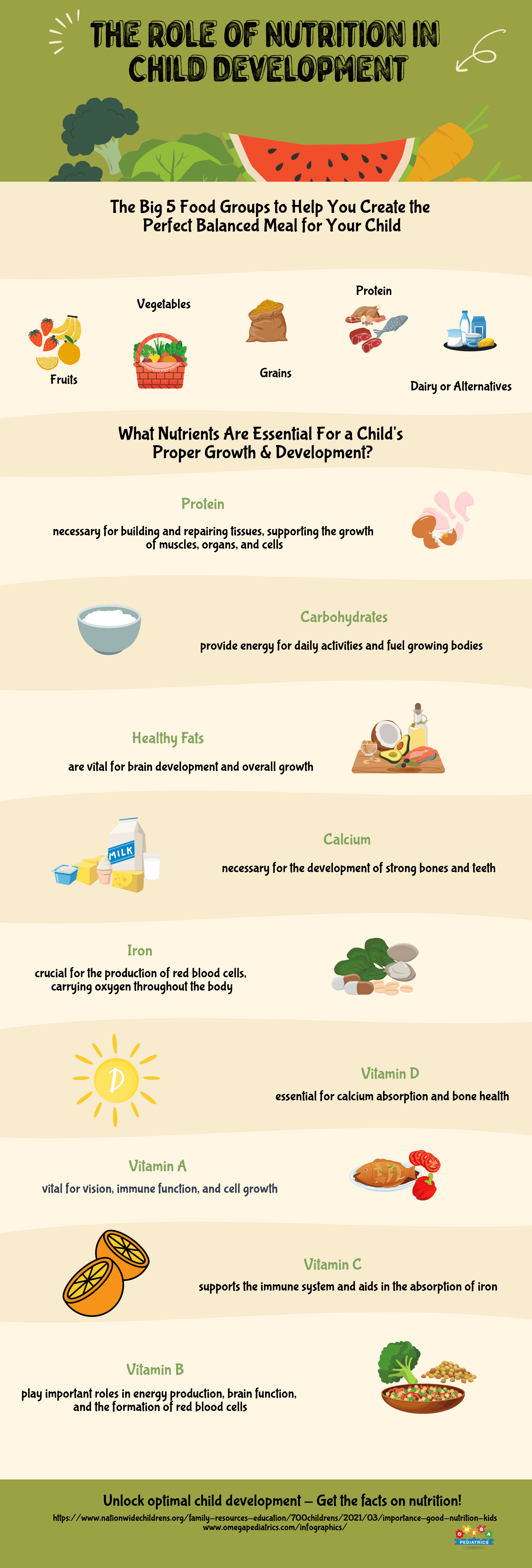
The Big 5 Food Groups to Help You Create the Perfect Balanced Meal for Your Child
- Fruits: Fruits are excellent sources of vitamins, minerals, fiber, and antioxidants. Encourage your child to consume a variety of fruits, such as berries, citrus fruits, apples, bananas, and melons. Fresh, frozen, or dried fruits are all good options.
- Vegetables: Vegetables are rich in vitamins, minerals, fiber, and phytochemicals. Aim to include a variety of vegetables in your child’s meals, such as leafy greens, carrots, broccoli, bell peppers, and sweet potatoes. Try to offer a mix of cooked and raw vegetables to maximize nutrient intake.
- Grains: Grains provide carbohydrates, fiber, and various essential nutrients. Opt for whole grains whenever possible, as they offer more nutrients and fiber compared to refined grains. Include foods like whole wheat bread, brown rice, quinoa, oats, and whole grain pasta in your child’s diet.
- Protein: Protein is crucial for growth and development. Good sources of protein include lean meats (chicken, turkey, fish), eggs, beans, lentils, tofu, dairy products (milk, yogurt, cheese), and nuts. Aim to include a variety of protein sources in your child’s meals to ensure they receive a range of nutrients.
- Dairy or Alternatives: Dairy products provide calcium, protein, and other essential nutrients. If your child tolerates dairy, include options like milk, yogurt, and cheese in their diet. If your child is lactose intolerant or follows a dairy-free diet, consider alternatives like fortified plant-based milk (soy, almond, oat), tofu, or calcium-fortified non-dairy yogurt.
What Nutrients Are Essential For a Child’s Proper Growth & Development?
- Protein: Protein is necessary for building and repairing tissues, supporting the growth of muscles, organs, and cells. Good sources of protein include lean meats, poultry, fish, eggs, dairy products, legumes (beans, lentils), and tofu.
- Carbohydrates: Carbohydrates provide energy for daily activities and fuel growing bodies. Choose complex carbohydrates like whole grains (brown rice, whole wheat bread, oats), fruits, vegetables, and legumes, which offer fiber and essential nutrients.
- Healthy Fats: Healthy fats, such as omega-3 fatty acids, are vital for brain development and overall growth. Include sources like fatty fish (salmon, tuna), avocados, nuts, seeds, and olive oil in your child’s diet.
- Calcium: Calcium is necessary for the development of strong bones and teeth. Dairy products (milk, yogurt, cheese) are excellent sources of calcium. If your child doesn’t consume dairy, consider alternatives like fortified plant-based milk, calcium-fortified tofu, or leafy green vegetables (spinach, kale).
- Iron: Iron is crucial for the production of red blood cells, carrying oxygen throughout the body. Good sources of iron include lean meats, poultry, fish, fortified cereals, beans, lentils, and leafy green vegetables. Pairing iron-rich foods with vitamin C sources (citrus fruits, tomatoes) helps enhance iron absorption.
- Vitamin D: Vitamin D is essential for calcium absorption and bone health. The primary source of vitamin D is sunlight exposure, but it can also be obtained from fortified dairy products, fatty fish, and supplements if needed.
- Vitamin A: Vitamin A is vital for vision, immune function, and cell growth. It can be found in orange and yellow fruits and vegetables (carrots, sweet potatoes), leafy green vegetables, and dairy products.
- Vitamin C: Vitamin C supports the immune system and aids in the absorption of iron. Include citrus fruits, berries, kiwi, tomatoes, bell peppers, and leafy green vegetables as sources of vitamin C.
- B Vitamins: B vitamins, including folate, B6, and B12, play important roles in energy production, brain function, and the formation of red blood cells. They can be found in whole grains, legumes, leafy greens, eggs, poultry, meat, and dairy products.
The Importance of Hydration in Child Development
Proper hydration is a fundamental aspect of a child’s overall well-being, playing a crucial role in various physiological processes that contribute to their growth and development. Water is essential for nutrient transportation, temperature regulation, and overall organ function. Dehydration can negatively impact a child’s cognitive function, mood, and physical performance.
The Role of Water in Child Development
Water is a vital component for the proper functioning of the human body, constituting a significant percentage of a child’s body weight. It aids in digestion, nutrient absorption, and the elimination of waste products. Encouraging your child to drink an adequate amount of water throughout the day is essential for maintaining optimal health.
Parents should be mindful of their child’s hydration needs, especially during physical activities or in hot weather. In addition to water, incorporating hydrating foods like watermelon, cucumbers, and oranges can contribute to overall fluid intake.
Tailoring Nutrition to Different Developmental Stages
Children undergo distinct developmental stages, each requiring specific nutritional considerations to support their growth. Understanding these stages can help parents make informed choices about their child’s diet.
Infant Nutrition
During the first year of life, infants primarily rely on breast milk or formula to meet their nutritional needs. Breast milk provides essential antibodies, promoting a strong immune system. If breastfeeding is not an option, choosing a suitable formula with the necessary nutrients is crucial for proper development.
As infants transition to solid foods around six months of age, introducing a variety of nutrient-rich foods is vital. Pureed fruits, vegetables, and iron-fortified cereals can contribute to a well-rounded diet. Always consult with a pediatrician before introducing new foods to ensure they align with the child’s developmental stage and potential allergies.
Toddler Nutrition
Toddlers are known for their unpredictable eating habits, making it important for parents to create a supportive environment for healthy eating. Finger foods, such as small fruit slices, vegetable sticks, and whole-grain crackers, can encourage self-feeding and exploration of different textures and flavors.
Introducing a diverse range of foods helps establish healthy eating habits. Toddlers may show preferences for certain foods, but providing a balanced diet ensures they receive the necessary nutrients for optimal development.
Addressing Picky Eating Habits
Many parents face the challenge of dealing with picky eaters, and it’s essential to approach this issue with patience and creativity. Encouraging a positive relationship with food involves exposing children to a variety of flavors and textures from an early age.
Tips for Managing Picky Eating
- Incorporate Variety: Offer a diverse range of foods, including those from different food groups. This not only ensures nutritional balance but also exposes children to various tastes.
- Involve Children in Meal Preparation: Allowing children to participate in meal preparation can make them more interested in trying new foods. It’s a fun and educational way to teach them about different ingredients and cooking techniques.
- Be a Role Model: Children often mimic the eating behaviors of their parents and caregivers. Demonstrating a positive attitude towards a variety of foods sets a good example for them.
- Gradual Introductions: If a child is resistant to certain foods, introduce them gradually and in different forms. For example, a vegetable they dislike cooked might be more acceptable raw or blended into a smoothie.
Adapting Nutrition to Dietary Restrictions
Some children may have dietary restrictions due to allergies, intolerances, or cultural and ethical considerations. It’s crucial for parents to navigate these challenges while ensuring their child receives a nutritionally adequate diet.
Managing Allergies and Intolerances
If a child has allergies or intolerances, careful food selection is essential to avoid triggering adverse reactions. Reading food labels, communicating with school staff, and educating caregivers are crucial steps in managing these dietary restrictions.
Catering to Cultural and Ethical Choices
Families with specific cultural or ethical dietary choices may need to find alternative sources of essential nutrients. For example, vegetarian or vegan diets require careful planning to ensure an adequate intake of protein, iron, calcium, and other vital nutrients. Consulting with a pediatrician or a registered dietitian can provide valuable guidance in maintaining a balanced diet within these dietary preferences.
The Impact of Physical Activity on Nutritional Needs
Physical activity is an integral part of a child’s development, influencing their overall health and well-being. Proper nutrition plays a vital role in supporting their energy levels, endurance, and recovery.
Pre- and Post-Exercise Nutrition
Before engaging in physical activities, children benefit from a balanced meal or snack that includes a combination of carbohydrates, proteins, and fats. This provides sustained energy and helps prevent fatigue during activities.
After physical exertion, replenishing glycogen stores and providing adequate protein for muscle recovery is crucial. Nutrient-dense snacks like yogurt with fruit or a turkey sandwich on whole-grain bread can contribute to post-exercise recovery.
Nutritional Considerations for School-Age Children
As children enter school, they may face new challenges related to nutrition. Peer influence, cafeteria food options, and busy schedules can impact their dietary choices. It’s essential for parents to foster healthy eating habits and educate their children about making nutritious choices.
Packing Nutrient-Rich School Lunches
Preparing balanced and appealing school lunches can be a key factor in supporting a child’s nutrition. Including a variety of fruits, vegetables, whole grains, and protein sources ensures they have the energy and focus needed for a day of learning and activities.
Parents can involve their children in the lunch preparation process, allowing them to choose healthy options and develop a sense of autonomy in making nutritious food choices.
The Role of Nutrition in Cognitive Development
Nutrition plays a critical role in cognitive development, influencing a child’s ability to learn, concentrate, and solve problems. Certain nutrients, such as omega-3 fatty acids, antioxidants, and vitamins, are particularly beneficial for brain health.
Brain-Boosting Foods
- **Fatty Fish:** Rich in omega-3 fatty acids, fatty fish like salmon and trout support brain function and development.
- **Berries:** Blueberries, in particular, are known for their antioxidant properties, which may contribute to improved cognition.
- **Nuts and Seeds:** Walnuts and flaxseeds contain omega-3 fatty acids and are convenient snacks to support brain health.
- **Leafy Greens:** Vegetables like spinach and kale provide essential vitamins and minerals that contribute to overall brain function.
- **Eggs:** A source of choline, eggs support memory and brain health.
Navigating the World of Children’s Supplements
While a well-balanced diet should ideally meet a child’s nutritional needs, certain circumstances may warrant the consideration of supplements. However, it’s crucial to approach supplementation with caution and under the guidance of a healthcare professional.
Common Children’s Supplements
- Vitamin D: Especially important for bone health, vitamin D supplements may be recommended, particularly in regions with limited sunlight exposure.
- Omega-3 Fatty Acids: If a child does not consume sufficient fatty fish, omega-3 supplements can support brain and eye development.
- Iron: Some children, particularly those with restricted diets, may require iron supplements to prevent deficiencies.
Conclusion
In conclusion, the role of nutrition in child development is multifaceted, encompassing physical growth, cognitive function, and overall well-being. Parents play a pivotal role in shaping their children’s eating habits, providing a foundation for a lifetime of healthy choices. By understanding the diverse nutritional needs at different developmental stages, addressing picky eating habits, and navigating dietary restrictions and physical activity considerations, parents can optimize their child’s nutrition for optimal growth and development. Always consult with healthcare professionals or registered dietitians for personalized advice tailored to your child’s specific needs and circumstances.



